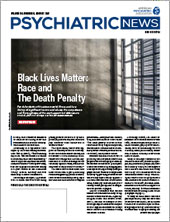Prescribing for family members violates the Medical Practice Act (MPA) in most states, yet physicians continue to do so. Violations of the MPA result in disciplinary action by licensing boards.
Why do physicians continue to engage in this practice long after the MPAs have discouraged and punished it? In a previous column, I have examined prescribing for friends and family from the perspective of the ethical principles of beneficence and fidelity (
Psychiatric News). This column considers how the concept of conflict of loyalties may illuminate this frequent dilemma.
A conflict of loyalty arises when a physician owes a duty of loyalty to more than one entity and the interests of those entities diverge. Especially for our closest family members—parents, spouses, and children—our sense of loyalty is visceral. Consider a scenario in which a young adult child returns home after graduating from college and is about to run out of a prescription. The prescriber is out of state, in the city where the youth attended college. The local pediatrician hasn’t seen the youth for three years and no longer considers him or her a patient in the practice. It may take a month or more to get an appointment with a new primary care provider, by which time the medication may be gone. It is very tempting to fill the gap by prescribing the medication. A deep sense of loyalty to the adult child may feel more compelling than a rule written in an MPA we may have never read.
In this scenario, loyalty to the adult child may conflict with loyalty to our professional standards. We are dedicated to practicing medicine within our scope of practice, with skill and diligence. We don’t prescribe to a new patient without first taking a detailed history, conducting a thorough exam, considering diagnostic and treatment alternatives, ordering any necessary labs and studies, engaging in an informed consent discussion with the patient, and documenting all of this in the medical record. If we veer from this practice outside of an emergency, we not only violate the MPA, we compromise our professional standards. Innate loyalty to one’s child may override the abstract loyalty to professional codes, but a closer look may help resolve the apparent conflict.
If by rescuing the adult child from the urgent need to refill the prescription, we also impede their motivation to find a new personal physician, are we really helping? If the child is due for labs to monitor the medication, do we know this? Do we order the labs? Do we do the appropriate physical exam for the underlying health condition? Do we create a medical record in which we document all of this? Is the condition for which the medication is prescribed within our scope of practice? Has our child become our patient? Does this serve the best interest of our child? If the answer to one or more of these questions is no, then our initial instinct to prescribe the medication out of loyalty to the child starts to look like a subtle form of disloyalty. The best treatment for the adult child is not one given by the parent, and coming to the rescue in the short term may delay finding a more appropriate solution for the long term.
Certainly, there may be true emergencies, such as a child with a seizure disorder running out of an anticonvulsant, in which case filling the gap temporarily may be appropriate and ethical. Even in these scenarios, there is a risk that the one-time emergency prescription breaks a barrier, making subsequent prescriptions easier to write because of “creeping normalcy.” Creeping normalcy is the process by which incremental, small changes bring about an undesirable result. It is another way of conceptualizing the slippery slope of boundary crossings.
Before quickly solving the problem for our loved one, it is wise to pause and consider potential undesirable consequences of our reflexive impulse to rescue. The most loyal thing to do may be to keep our roles distinct—by being a family member and not a physician. ■

